
March 26
“It’s not what happens to you. It’s what you do with what happens to you.”
The Paralympics were a whirlwind, I can’t believe they are already over! I could not be prouder of our U.S. Team and the success they had, having one of the strongest ever showings at the Winter Games. The team of 74 athletes won 36 medals and finished at the top of the overall medal count. I recently had the pleasure of catching up with Paralympic legend, Chris Waddell. Chris is an American Paralympic sit-skier and wheelchair track athlete. He was a promising able-bodied skier while attending Middlebury College in Vermont before a skiing accident left him paralyzed from the waist down. He returned to college just two months after the accident, started monoskiing in less than a year and was named to the U.S. Disabled Ski Team a little more than two years later. 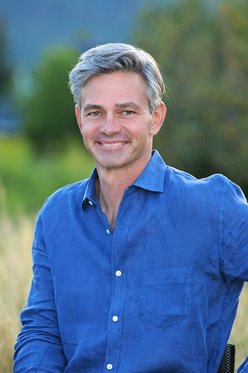 With 12 Paralympic medals, he became the most decorated male monoskier in history. Also a track athlete, he’s one of a handful to have won World Championships in both the winter and the summer. He competed in four Winter Paralympics winning 12 medals and three Summer Paralympics and a silver medal in the 200 meters in Sydney. In World Championship competition, Waddell won nine total medals. Waddell was inducted into the U.S. Ski and Snowboard Hall of Fame and the Paralympics Hall of Fame. The Dalai Lama honored him as an “Unsung Hero of Compassion.” In September of 2009, Waddell became the first nearly unassisted paraplegic to summit Mt. Kilimanjaro. The film documenting his climb has won awards throughout the world. Chris has appeared on Dateline, Oprah and 20/20. He is the founder of the One Revolution Foundation and does his best to share the belief that, “It’s not what happens to you. It’s what you do with what happens to you.” This man has one of the strongest minds I have ever come across. He was kind enough to answer some questions below that will really help you or anyone you know feel motivated and unstoppable:
With 12 Paralympic medals, he became the most decorated male monoskier in history. Also a track athlete, he’s one of a handful to have won World Championships in both the winter and the summer. He competed in four Winter Paralympics winning 12 medals and three Summer Paralympics and a silver medal in the 200 meters in Sydney. In World Championship competition, Waddell won nine total medals. Waddell was inducted into the U.S. Ski and Snowboard Hall of Fame and the Paralympics Hall of Fame. The Dalai Lama honored him as an “Unsung Hero of Compassion.” In September of 2009, Waddell became the first nearly unassisted paraplegic to summit Mt. Kilimanjaro. The film documenting his climb has won awards throughout the world. Chris has appeared on Dateline, Oprah and 20/20. He is the founder of the One Revolution Foundation and does his best to share the belief that, “It’s not what happens to you. It’s what you do with what happens to you.” This man has one of the strongest minds I have ever come across. He was kind enough to answer some questions below that will really help you or anyone you know feel motivated and unstoppable:
Photo Credit: Jill Orschel
How would you like to see the Paralympics develop? What will they be like in 10 -20 year’s time?
We have been really lucky that each Paralympic event has been a stepping stone to something that is greater. I think that must continue and the biggest thing is making it mainstream. It is great sport, great entertainment and a great representation in a lot of ways of the human struggle. This is why we watch sports, we want to see someone struggle and be successful coming out of it because there is ultimately something to learn. I hope it makes it to the mainstream and changes some of the narrative. That if you see someone in the street it’s not, “Oh, it’s too bad what happened to you.” It’s, “What do you do? How can we connect as oppose to how are we separate?” Sport is an amazing way of connecting people because it connects us with our passion. When we connect with our passion we realize we are talking about the same thing.
What made you choose your sport?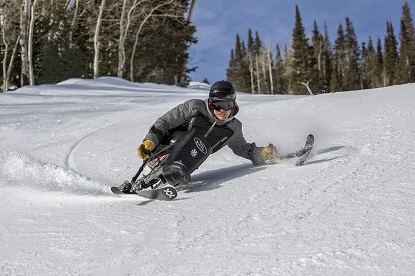
I grew up in Western Massachusetts and there was a little ski area near us. I got captivated by it – I started ski racing when I was six years old - my father and mother instructed at the mountain. They would pick us up from school and we would drive 10 minutes to the mountain and be there sometimes until nine o’clock at night. As a six-year-old, I wanted to be like the thirteen year olds on the mountain who I thought were the coolest guys in the world.
Photo Credit: Mike Stoner
Who is your hero? Who has inspired you?
I seem to collect heroes everywhere I go. My biggest heroes were really my mother and father, they were tremendous examples. But, when I came into skiing, the year before my accident, one of the people I came across was Diana Golden. She was at an enabled body ski race and my first thought was what is she doing here? Then I thought she was the most amazing athlete I had ever seen. Because she was basically in a sport riddled with excuses, I was like look, I am going to fall and I’m going to get back up and keep going. And for me, those are the scariest athletes because you might be in front of them but you know they are coming and they are not going to quit. I wanted to be so much like her after seeing her that day and then after my accident I wanted to do for other people what she had done for me.
How do you get a certain type of attitude across for someone living with or without a disability?
I believe that there are two different things that happen. For me, after my accident, everything really became black and white. I think in a lot of our everyday lives we can live in the grey area, but the black and white was that my accident was such a critical moment that I could potentially lose my life. I had to find a way to continue, to get better every single day. I think there is something to be said by that - in the grey area you can say you are mostly fine, and you just say, “Oh I’ll be better tomorrow,” but it was so critical that my mind had the ability to affect my ability to heal. I really had to be positive from then on and that was the power I could bring to my recovery. Now, I am trying to bring that same power to my everyday life. Sometimes we bring our best when we have to, but my greatest attribute now is my optimism. Everything is going wrong and I say, “You know what? I am not going to let it beat me, I am going to continue to be optimistic because it is going to give me the best opportunity to succeed.” I have a reminder on the screen saver of my phone that says, “Can I be optimistic?” And it is a way of approaching every day and I feel like people need a reminder to be committed. I want to be committed and that reminder for me makes me realize what it takes to really dig in.
What made you want to tackle summiting Mt. Kilimanjaro?
The most difficult thing that I did was retiring from competitive sport. It was more difficult for me to retire then it was to break my back. My identity was more tied to the success I had because in a lot of ways it made me not disabled, it made me just an athlete. After retiring, I didn’t know the image of who I was, where this sort of super image stopped and where I started. I couldn’t allow myself to be vulnerable. Climbing Mount Kilimanjaro was an opportunity for me to regain the platform that I had as an athlete and people understand that we are all climbing a mountain on some level. So, for me to climb a mountain in a way that was very physical and difficult, they understand and appreciate that struggle. We also had to tell the story. When I was competing in the Paralympics we weren’t even on television. So, I had to tell the story of that struggle to bring people there and give them a way to see me as an individual, beyond the wheelchair. So that is why I wanted to climb Kilimanjaro for both myself and so many other people.
What advice would you give to someone who just experienced an injury or diagnosis that will forever impact their mobility.
The biggest thing for me is finding something to be passionate about. Find a reason to get better. That might be for your children, for your spouse or so many other things. We need a reason to get better and wake up in the morning and say I am going to do this and realize that my success is a product of the sacrifices and pain that I have been willing to endure along the way to get there. It is about having a goal that is bigger than us ourselves.
Jim Craig
March 17
The American Dream
The “American Dream”, in my opinion, is what makes the United States of America the greatest country in the world. Starting in elementary school, we are taught that no matter what your race, gender, ethnicity, culture, or disability, anything is possible. Countries around the world envy the United States for the endless opportunities that are available. The American Dream symbolizes that with hard work and determination, you can achieve anything you set your mind to.
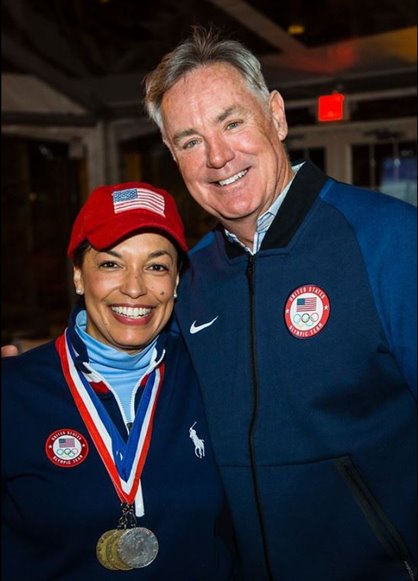
This past month, I sparked a relationship with Bonnie St. John. Despite having her right leg amputated at age five, Bonnie St. John became the first African-American ever to win medals in the Winter Olympic competition, taking home a silver & two bronze at the 1984 Winter Paralympics in Innsbruck, Austria. In my humble opinion, this woman is what the “American Dream” is all about. She is not only an Olympian but a successful business woman, a woman activist, pioneer of the Paralympics, and role model to countless - including myself. In a recent interview, we shared our stories about our experiences representing our country at the Olympic and Paralympic games.
I always talk about mentorship and the vision and leadership of our coach, Herb Brooks, and the influence he had on our victory in 1980. Bonnie had a slightly different story. She explained to me that in 1984, disabled sports did not have the breadth of resources the athletes enjoy today. Bonnie was on her own to organize the support she needed. She worked a variety of jobs and personally solicited sponsors to raise money so she could attend a boarding school for ski racers, travel to competitions, buy equipment, and hire private coaches to fulfill her dream of becoming an Olympian. To say her story was moving is an understatement. She represents what the “American Dream” truly means and she would stop at nothing to show the world that she could accomplish the “impossible.” She was an entrepreneurial athlete that has transcended into her successful business career.
While on the phone with Bonnie, our partnership with Numotion came up. I explained to her why our partnership meant so much to me, but how I struggled to find a way to utilize my platform as an Olympic athlete and spokesperson to further this cause. These days, people will look for reasons to criticize you for almost anything - even if we are trying to strive for the same overall objective. All I want to do is advance the conversation around CRT (complex rehab technology) because I am very passionate about the benefits and believe I can help make a difference. Bonnie gave me the best advice, she said, “Jimmy, don’t act like you’re an expert because you’re not and you’ll make mistakes. Don’t be afraid to talk about people living with a disability, it is worse when the conversation doesn’t happen because we are afraid of the outcome.” This is when a light bulb came on for me; this incredibly passionate and accomplished woman believed in me and supported my mission to help drive awareness for the CRT industry. She not only embraced my passion, but she has joined us in our mission to shift perceptions about ability and disability and drive awareness and access. She put us in touch with Paralympic athletes who have overcome mobility issues and thrived.
I am so excited to share with you the upcoming blogs and their stories of what it really means to achieve the “American Dream”.
GO USA!
Jim Craig
March 7
And the Games Begin
The 2018 Winter Olympics flew by, it was such a crazy and fun last couple of weeks. I was in Salt Lake City for the Opening Ceremonies and closed them out in Lake Placid. Being in two places where the Winter Olympics were held in the United States during the games is an incredible atmosphere! The hosting cities are so special to all Americans, but the magic especially comes to life during the games.
Although the Olympics are over, the Paralympics are about to begin and they are just as inspiring as the games that recently finished. During my time in Salt Lake City, I got to spend some time and get to know Bonnie St. John. Bonnie St. John was the first African-American ever to win medals in the Winter Olympic competition, taking home a silver and two bronze medals in the 1984 Winter Paralympics in Innsbruck, Austria. Her character and work ethic has made her tremendously successful and she is a true inspiration to everyone.
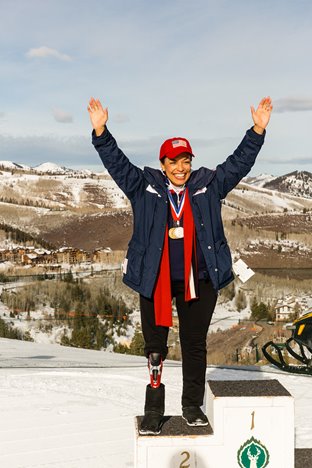
The 2018 Winter Paralympics will have 670 athletes from 80 countries. Compared to four years ago at the Sochi Paralympics, the total number of athletes has increased from 539 and the number of female athletes that are participating has been increased by 44 percent! This is an amazing improvement and I am so proud of the sponsors that support these athletes that represent their countries. These Paralympian athletes put on the USA sweater like any other Olympic athlete and symbolize what the American Dream really is, that anything is possible.
This year has been a huge milestone for Gold Medal Strategies when we teamed up with Numotion as a spokesperson to help drive awareness for the CRT (complex rehab technology) industry. I thought there was so much I knew about the industry before we officially partnered; I was wrong. I have been fortunate enough to use my platform to help companies and charities that I truly believe in. Each day, I learn something new and inspiring and get to work with people who have overcome tremendous adversity. Numotion’s mission is to improve the lives of people with disabilities by enabling them to actively participate in everyday life – really making some of their customer’s dreams become a reality.
Each story inspires me and reading some of the bios of the Paralympians preparing to compete are truly astounding. These competitors are some of the best athletes in the entire world. They make some of the most difficult sports look easy… and they are competing with a disability. Every athlete has their own story, whether they were born with an impairment or they are war veterans that are reinventing themselves after a devastating injury while serving our country, each competitor knows what it takes to be unstoppable.
The Paralympics are a place where dreams are born for some, and become a reality for others. These athletes are inspiring the next generation to go after what they believe in and that anything is possible. Good luck to all of those heading over to South Korea and go USA!!
GO USA!
Jimmy
February 26
Closing Ceremonies
This past weekend has been a whirlwind. I had the honor of being part of an USOC event that brought together a bunch of Olympians from different sports in Lake Placid, New York. Among them were Charlie White and Meryl Davis who won the Gold Medal in figure skating at the 2014 Sochi Winter Olympics, Sasha Cohen who also is an incredible figure skater that competed in the 2006 Torino Winter Olympics and Eric Heiden who competed with me in 1980. Eric was there with his family; the first time he had been back to Lake Placid since he won 5 gold medals on the skating oval.
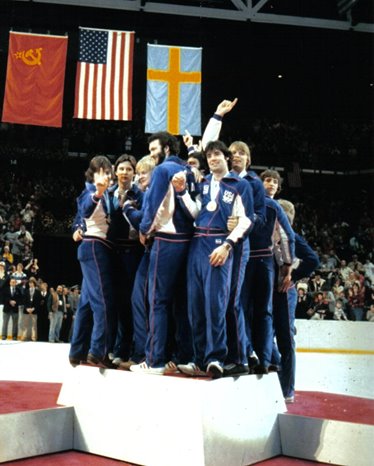
Once you are an Olympian you are always an Olympian, it becomes part of your identity. The connection that Eric and I built by supporting each other and being each other’s fans during those games was felt immediately, it was like no time had passed. The Olympic village is such a unique place where all the best athletes in the world come together and forget about all the chaos going on in the world. We are fans of each other, supporting one and other when we had the chance.
He shared a story about how the day of his big race he woke up to a knock on the door from his coach because he had overslept. He admits it was because he was at our game against the Russians and he knew he was watching history unfold and couldn’t bring himself to leave such a pivotal moment in sports history. Later that day he put on the best performance of his life and later we celebrated in the streets together being Olympic Gold Medalists. The comradery between the athletes in the Olympic village is something that is remarkable. We all understand that to get to the Olympics we all have gone through hard ships, struggles, victories, and sacrifices. I am so proud of all our Olympic athletes that went out and played their hearts out. It has been a pleasure and honor to watch a lot of them live out their dreams.
The closing ceremonies is always a difficult time. Our team in 1980 was a family, closer than any team that I have ever been a part of. Once the games end everyone goes their separate ways and life continues. Although the games come to an end our team will forever be a family. Each athlete leaves a legacy that inspires a younger generation, whether you know it at the time or not. What we did in 1980 inspired athletes who competed at the Pyeongchang Olympics and those athletes are inspiring the next athletes to not only dream big but to go after their dreams and that anything is possible.
Now that the Olympics are over, it is time to give the same love and support to the 2018 Winter Paralympics that will begin Thursday, March 8
th. These athletes have incredible stories and are role models for all athletes around the world. Good luck to all the athletes preparing to compete, I can’t wait to watch!
Best,
Jimmy
February 22
Miracle!
Wow, has it really been 38 years? It is crazy how quickly time flies! Right now, I am in the car with my wife trekking through a snow storm in upstate New York to go back to the place where all the magic happened; Lake Placid, New York. I woke up today so excited after the huge shoot-out victory the US women’s hockey team had over their longtime rivals Team Canada. Right from the beginning of the game you could feel the energy – these women on both teams have been huge role models for women’s hockey all over the world and the US had some unfinished business to take care of. If Canada would have won last night, they would have been the first team in men’s or women’s Olympic hockey to have won 5 straight Olympics – the first time a team has been in that position since the Soviets at the 1980 Olympic games. The determination, grit, hard work, discipline and togetherness of Team USA reminded me a lot of our 1980 team. February 22
nd will forever be a day marked in the history of USA hockey.
.jpg)
Today I feel nostalgic – I can’t wait to go back into locker room #5 and stand at center ice and close my eyes and remember. Remember that moment in history, that moment that forever changed my life. Going into the game we were considered the underdogs and were predicted to get dominated by the Soviet Olympic team like we did a few weeks prior at Madison Square Garden. However, people do not understand that Herb Brooks had been preparing for that game way before the Olympic team was even chosen. He knew how to change the way we played and how to defeat the unstoppable Russian team. Going into the Olympics we knew that we were going to be the best conditioned team. Herb’s famous line was, “The legs feed the wolf, gentlemen” and he meant it. He thought our team how to train, think, and play differently. He was a leader that pulled greatness out of everyone in different ways without us even knowing he was doing it. He took 20 individuals from having the same dream and turned it into a shared dream.
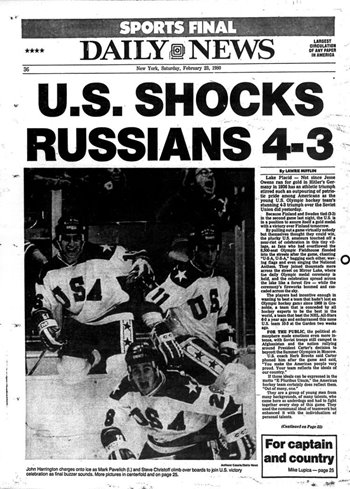
During the Soviet game, I treated each period like it was a full game and broke down the period into three sections. In between each period, I would take off my equipment and put it back on to refocus for the next period – forgetting what had happened the period before. Anyone on our team will tell you that after we took the lead we knew the game was far from over. Herb trained us to be mentally prepared for anything that came our way. Together we stood as one unit and showed the world why the United States should never be underestimated.
It is so humbling that our game 38 years ago is still relevant today and that people still feel inspired by it. The beauty of what our team accomplished in Lake Placid was way beyond a hockey game – it was felt across the nation and it gave hope to people to take risks and to believe in the impossible. In the words of Herb Brooks, “Great moments are born from great opportunities” so make sure you are taking full advantage of every opportunity and do not be intimidated by the impossibility but motivated by the possibility.
GO USA!
Jimmy
February 16
Olympic Memories
People always ask me, “Jimmy, what is your favorite Olympic memory?”. I can’t speak for my teammates, but for me it is a tie between two separate memories. Each memory I cherish for different reasons… but I don’t think I could choose one, “favorite”. It’s funny, most people recall the game when we upset the Soviets 4-3; but that wasn’t the Gold Medal game! Everyone in our locker room enjoyed that victory for a brief second before Herb reminded us that our job wasn’t done and the Olympics was far from over. Of course, beating the Russians felt AMAZING! To have the support from unwavering fans screaming, U-S-A, U-S-A from the rafters at a sold-out game was something I cannot accurately put into words.
I still get chills thinking about how our team came together and could take the same dream and transform it into a shared dream under the leadership of Herb Brooks. Our country needed to feel good again, and my teammate Jack O’Callahan said it best when he stated that when we put on that USA jersey it was like our own fight against what was going on during the Cold War. I think that is why our team’s story is still so relevant today – people were invested in that game beyond the ice rink. We could show that when all the odds were against us, the United States could not be stopped.
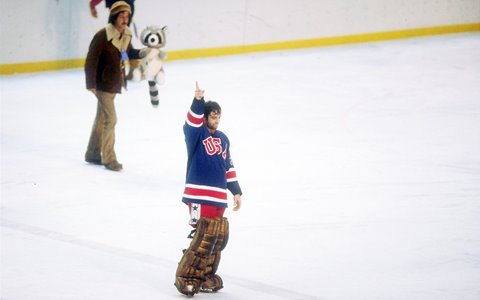
The first memory of mine is one that was a very intimidate moment between me and my father that was captured by the media. A lot of people do not realize that to achieve your dreams and goals it takes the love, support, and sacrifice of those around you. Although we were celebrating my success, I wanted to share that moment with my family. Without the love and support of my dad and mom I would not have had the opportunity to be an Olympian. Seeing the joy on my dad’s face and how proud I made him that I was his son is something that I will cherish for the rest of my life.
The second memory is when Mike Eruzione called up our team during the medal ceremony. It was a miracle that we could get 20 grown men onto one podium! But being there, surrounded by the family we started the adventure with in Lake Placid, was a perfect ending to an incredible ride. Singing our national anthem loud and embracing each other while we watched the United States flag being raised higher than all the other competing countries was the proudest moment of my life. What we accomplished was amazing, I am so grateful that I was given the opportunity to represent our country and have a platform now that I truly believe I help companies and individuals reach the best of their abilities. With hard work, determination, and the right leadership, you can accomplish anything you set your mind to.
I’ll leave you with one of my favorite sayings that I think is relevant, “Don’t ever let your memories be bigger than your dreams.”
GO USA!
Jimmy
February 13
USA Hockey Takes Center Stage
USA Olympic hockey is finally here and I could not be more excited! Both the US Men and Women teams are looking to create history. The women are looking for some unsettled scores and to take home the gold. Their fire, determination, and perseverance is paving the way for women’s hockey. It is incredible how much these young women have been able to grow the sport and inspire young girls around the
world. Waking up early to watch the US Women’s team defeat Finland 3-1 was incredible! It reminded me a lot of how our Olympic journey started in Lake Placid. Coming back from behind and coming together to play as a unit with a shared dream. I am so excited to follow their journey and watch their dreams become a reality.
There has been a lot of anticipation for the US Men’s hockey team. The NHL’s decision to not allow professional athletes to participate has opened the door to amateur players. It is their chance to show what they have to offer on a world stage! This opportunity allows them to not only represent their country, but to bring some extra fire to the game. To a lot of these players, this is an opportunity that they probably never dreamed of. Back in 1980, our team was made up of mostly college kids ages 20-22. So, this Olympics is especially special to me; I feel like I connect with a lot of these players on a higher level. I know the excitement they are feeling, the pressure of the unknown, and the sheer privilege of being able to put on that jersey and represent our country.
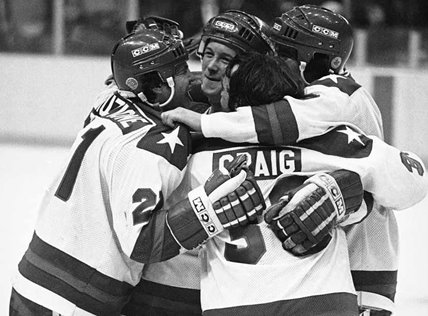
I cannot wait to watch the games and wish nothing but the best to all the US athletes competing. The time is now, all your hard work and preparation is for this – go out there and show them what USA is made of!
February 9
The Winter Olympics Are Here!
Every time the Winter Olympics are about to start, I get a rush of emotions that remind me how lucky I am to be able to say I am an Olympic Gold Medalist. It seems like it was just yesterday that the small town of Lake Placid was transformed into a world stage for athletes from all over the world to compete and live out their dreams. I was only a 21-year-old with high expectations, & my teammates and I were committing to a shared dream while believing in something bigger than ourselves.
The opening ceremonies were an incredible achievement, a moment I will cherish forever. To be able to walk side by side with the greatest athletes in the world and forget about all the chaos that is going on in the world outside of the games is something that is hard to put into words. There is a strong presence of nationalism and unity between all countries. Being in the United States and watching our flag wave amongst the rest of the competing countries made me realize that having big dreams is worth all the hard work and that the impossible becomes possible when you believe. There was no doubt that it was the mentorship and sacrifices by an army of role models, especially my family, to help get me to that moment. I would not have had the opportunity to represent our country if it was not from the unwavering support of those around me.
I still get chills recalling our national anthem being played when we achieved our dream and won the gold medal - I felt like I was sharing that moment with our country. At that moment, I would have never in my wildest dreams have predicted what our team was able to accomplish or the positive effect that we would have on our country. To a lot of people our game represented hope and allowed them to feel good again and believe the United States was unstoppable no matter what the odds. It amazes me that still 38 years later, I get stopped and told that people of all ages that they can remember exactly where they were, who they were with, and what they were doing when we defeated the Soviets. My teammates and I now can watch and appreciate all these young athletes live out their own dreams and create their own stories.
.jpg?width=320&height=400)
When the Winter Olympics were held in on Salt Lake City my teammates and I had the honor of lightning the cauldron at the Opening Ceremonies in Salt Lake City, Utah. My role has shifted from a Olympian to a fan, and it amazes me how much technology allows you to feel like you are on the same journey with these athletes. I wish all of the Olympic and Paralympic athletes a safe and successful journey that they will cherish for a life time. Good luck as the world and I cheer you on along the way!
Go USA!
Video Messages from Jim:
Why Numotion - Jim discusses his partnership with Numotion
Dreams - Jim discusses the importance of dreams
Goals - Jim discusses goal setting and accountability
Productivity - Jim discusses productivity
Why CRT - Jim discusses why he's passionate about CRT advocacy
About Jim Craig
Jim Craig is an American ice hockey goaltender who was part of the U.S. hockey team that won the gold medal during the 1980 Olympics at Lake Placid, New York. The American victory in the hockey tournament, known as the “miracle on ice,” was one of the greatest surprises in the history of the Olympics. Craig, who started every game in goal, was a leading figure in the team’s success. One of the enduring images of the 1980 Games was of Craig, wrapped in the American flag, searching the stands for his widowed father in order to share the gold-medal-winning victory. Following the Olympics, Craig played in the NHL for the Atlanta Flames, Boston Bruins, and Minnesota North stars before he suffered a career ending injury. Today, Jim is the President and Owner of Gold Medal Strategies, a motivational speaking and training company where he travels across the U.S. inspiring individuals and teams to be the best they can be and emphasizing that anything is possible when you believe. For more information, follow Jim on his social media channels (Facebook, Twitter and Instagram).